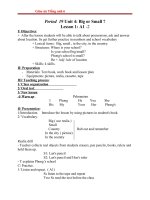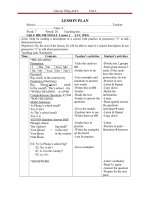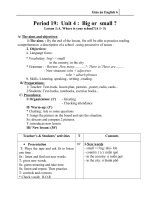Giáo án Tiếng Anh 11 Unit 4: Volunteer work
Bạn đang xem bản rút gọn của tài liệu. Xem và tải ngay bản đầy đủ của tài liệu tại đây (155.32 KB, 23 trang )
GIÁO ÁN TIẾNG ANH 11
UNIT 4
VOLUNTEER WORK
Part A : Reading
I.
Teaching aims :
Reading for specific information
Reading comprehension
II.
Method :
Communicative approach
III.
Teaching aids :
Pictures, chalks, cassette.
IV.
Teaching Procedures :
STAGES
A.PRE-
TEACHER’S ACTIVITIIES
Warm- up:
READING
-Show the picture of volunteer
5 minutes
work and ask questions :
What is the old woman
STUDENTS’ ACTIVITIES
-Work in groups .
-Answer the questions
doing ?
What does she do this work
for?
-Check the answers
-Give Ss the following saying :
-Read and guess the meaning
of the saying in their text book
“If you me a fish,
I will eat today
If you teach me to fish
I will eat my whole life long.” -Answer the question.
-Ask Ss what the saying
implies.
-Take notes.
-Identify the pictures.
-Check the answer.
B. WHILEREADING
20 minutes
-Supply Ss music and some
more pictures of Volunteer
Work.
-Ask Ss to match new words
-Do in group-work.
-Match the words with
sentences
with
explanation.
1. Volunteer (n)
2. Orphanage (n)
3. Handicapped people
4. Disadvantaged people
-Check their answers :
1-c
2-d
-Take notes
3-a
4-b
TASK 1: (5’)
-Individual work
-Ask for filling the blanks .
-Read all of the sentences in
-Give the explanation of related
task 1 and fill in each blank .
words.
1. Voluntary (adj)
2. Voluntarily (adv)
3. Volunteers (n)
4. Volunteers (v)
-Take notes .
-Correct their mistakes.
TASK 2: (8’)
-Pair-work
-Ask for sts to read the text
-Read the text again silently.
again silently.
-Ask sts to choose thebest
-Choose the best answer.
answer
-Check their answers
1-B, 2-A, 3-D, 4-B, 5-C
-Give feedback
-Take notes.
-Group- work
TASK 3: (7’)
-Read all of the questions in
-Ask Ss to discuss then answer
task 3 and then answer them .
the questions in task 3 .
-Check their answers.
1.They usually visit hospitals,
orphanages or homes for the
ages.They read books to the
people or listen to their
problems
2.They help them to
overcome
the difficulties and give care
and
comfort to them .
3.During summer vacations,
C. POST-
they volunteer to work in
remote or mountainous area to
provide education for children
READING
9 minutes
or medical services for local
people.
-Ask Ss to discuss then answer
-Group- work
-Discuss the questions
-Answer the questions
the following questions.
1.Why do people do volunteer
work ?
-Report in front of class .
2. Have you ever joined any
volunteer work before ?
HOMEWORK -Ask sts to make a report in
front of class .
-Correct their mistakes.
-Ask sts to
Review the text
Prepare the new section of
unit4
Part B-Speaking .
-Take notes.
UNIT 4
VOLUNTEER WORK
Part B: Speaking
I.Objectives:
Talking about types of volunteer work
Asking and answering questions about volunteer work
II.
III.
Methods:
Communicative approach
Teaching aids:
Pictures, chalks, board
IV.
Stages
Teaching procedures:
Teacher’s activities
Warm -
- Ask students to look at the
up (5’)
picture in their books and
Students’ activities
- Answer the questions:
answer two questions:
1. What are these students
doing?
1. They are helping an old
man with the housework.
2. Are they volunteers?
2. Yes, they are.
TASK 1
Pre –
speaking
(8’)
- Have students do Task 1 in pairs
- Do Task 1 in pairs
- Ask students to give their
-
answers
Give the
answers
- Explain some activities of
- Take notes
volunteer work
• Helping people in the remote
or mountainous areas
• Giving care and comfort to
the poor and sick
• Providing education for
disadvantaged children
• Joining in the Green
Saturday Movement
- Correct the mistakes
TASK 2
- Have students do Task 2 in pairs
- Give some suggestions:
While
speaking
(20’)
• Providing minority children
with literacy (teach them
how to read and write)
• Working in difficult or
flooded areas (help them
rebuilt houses, provide
medical services, etc)
• Raising money to help the
handicapped or starving
children (put money in a
- Do Task 2 in pairs
- Take notes
piggy bank)
• Taking part in directing the
traffic (stand at the
crossroads during rush
hour to help direct the
traffic)
• Volunteering in homes for
the elderly (clean up/
repair their houses, do the
washing up, do some
shopping, mow their
lawns, take care of them,
read books, etc)
- Have students perform the
dialogue in front of class
TASK 3
- Have students do Task 3 in
groups
- Give some suggestions:
• What kind of volunteer work
do you usually take part in?
• What do you think about it?
- Correct common mistakes
- Perform in front of class
Post –
Speaking
(8’)
- Work in groups
- Take notes
- Each group gives a short
presentation.
V.
Homework:
Review Part B carefully
Prepare Part C – Listening
UNIT 4
VOLUNTEER WORK
Part C: Listening
I.
Aims of the lesson:
-
Help students listen and understand the passage
-
Help students number the pictures in their correct orders
II.
Teaching aids:
-
Textbooks, tapes, pictures, chalk, board, headphones, cassette player
…
III.
Procedures:
* Warm up: T asks students to make questions for the given answers.
1.
Do you usually take part in volunteer work?
2.
What kind of volunteer work do you usually take part
in?
Suggested answers:
1. Yes, I am
No, I am not
2. Helping disabled children how to read, write , .. taking part in directing the
traffic, raising money to help people in the flooded areas, ....
Stages
Pre-listening
Teacher’s activities
-
T
asks
students
Students’ activities
to -
Pair works
complete the questions in “Before you listen”
-
Complete
the
questions
T asks students to listen -
Give oral answers
and repeat the new words (pay -
Listen and repeat
attention to the pronunciation of
these words)
-
T has students carry out
it
Whilelistening
Task 1:
T corrects mistakes
Listen to the tape and do task 1.
* T asks students to read Task 1 Suggested key:
silently
Introduce the passage: It is about
May School in Ho Chi Minh city
* T asks students to listen to the tape
twice and fill in the missing
information
1. informal
2. 30 street children
3. 250 children (with special
difficulties)
4. 1998
5. volunteers
* T gives feedback and remarks.
Task 2:
- T asks students to scan the given - Pair/ group works
questions to set the contents of the - Read the questions silently.
conversations need listening.
- Listen to the tape
- T plays the tape and asks students - Answer the questions
to listen and answer the questions.
- T asks students to write their
answers on the blackboard.
Suggested key:
1.
correct mistakes.
provides
classes
for
disadvantaged children in Ho
- T has students listen to the tape
again to check these answers and
It
Chi Minh city
2.
Dance, theater, singing and
circus classes were set up in
1999.
3.
Because they need money to
continue their English and
Performance Arts classes.
4.
They
perform
circus,
theater, dance and singingat
-
one of the largest hotels in Ho
Chi Minh city.
5.
Because they can contact
sponsors and help to expand
the school activities.
Post-listening
- T asks students to work in groups
- Group works
- T asks students to retell the story.
- Retell the story
- T ask a representative of each - Discuss and perform in front of
group to talk in front of class
- Give
remark
mistakes
IV. Homework:
and
correct
class.
the
- Listen to the tape again at home and do the exercises in the workbook.
- Prepare part D: writing
UNIT 4
VOLUNTEER WORK
Part D: writing
I.
OBJECTIVES:
• Writing sentences.
• Writing a letter to express gratitude.
II.
METHOD:
• Communicative approach
III.
TEACHING AIDS:
• Chalks , board, outline, pictures
IV.
TEACHING PROCEDURES:
Stages/Time
Teacher’s activities
Studends’activities
Pre-writing
- Ask Ss some questions about
Answer the questions
7’
their situations:
1/ Have you ever received a
donation? When? From whom?
2/ What did you do then?
Did you write a letter for
thanks?
- Some key words:
Donor
While-writing
27’
Donate
Notice the words
Donation
Handicapped(picture)
fund
1/ Task 1:
Ask Sts to read the letter and
underline the sentences that
express the points:
Do the task 1:
Read and take notes:
* The opening of the letter
* The donated amount
* The way the money is used
* The way the receipt is issued
- “Dear Sir /Madam”
- “I am very …..some days
ago”
- “The money
* The gratitude to the donor
will…..students”
* The closing of the letter
- “We will certainly…
Notice: Some sructures:
- S + be + adjective+to+infinitive
- To receive sth from sb/sth
- Would like+ to infinitive
- To hope +to infinitive
+ for sth
possiple”
- “I would like………
company”
- “ I look …..faithfully”
2/ Task 2
- Three parts of a letter.(picture)
- Ask Sts to do task 2 ;
First :
the opening
Give outline:
Second:
the body of the
* ( the points in task 1)
3/ Correcting( 2 or 3 letters of
sts)
letter
Third:
Conclusion/The
closing
• Vocabulary
• grammar
Post writing :
Writing in pairs.
Some sts write their letters on
9’
Report writing ( task 1)
the blackboard.
Sts rewrite the letter ( task 1)
Homework:
• Write the letter by themselves
• Prepare Part E : Language focus
UNIT 4
VOLUNTEER WORK
Part E: Language focus
I.
Objectives:
• Pronunciation:
/w/ and /j/
• Grammar:
- Gerund and present participle
- Perfect gerund and perfect participle
II.
•
III.
•
IV.
Methods:
Communicative approach
Teaching aids:
Chalks, board
Teaching procedures:
CONTENT
TEACHER’S ACTIVITIES
STUDENTS’
ACTIVITIES
A.
Pronunciation:
1. Warm-up:
-
Have students listen
and repeat the sounds /w/
and /j/
2. Practice
reading
the
sentences provided
-
We went for a walk
-
Listen
and
repeat
-
Practice
chorus
in
in the woods near the
railway.
-
We
wore
warm
clothes and walked quickly
to keep warm.
-
Excuse me. Did you
use to live in New York?
-
Did you use to be a
tutor at the university?
B.
Grammar:
1. Gerund
and
present
participle:
- Give some examples:
A.
Gerund:
A gerund is the Verb – ing form.
Ex:
1. There’s no point in waiting.
2. I don’t mind cooking the meals.
3. Reading French is easier than
speaking it.
The gerund can be used in the
following ways:
∗
as subject of a sentence:
-
Listen
take notes
and
Skiing can be dangerous.
∗
as complement of a verb:
Her hobby is painting.
∗
after prepositions:
He was accused of smuggling.
∗
After certain verbs (eg.
admit, avoid, deny, dislike, enjoy,
excuse + object, forgive + object,
fancy/imagine, finish, keep, mind,
ect.)
∗
In noun compounds:
My school has a swimming pool.
B.
Present participle:
Form: Verb – ing
Ex:
1. Can
you
smell
something
burning?
2. We had to leave the tree lying
there.
3. He spent a fortune rebuilding that
old house.
Use:
We can use the present participle
∗
to form the continuous
tenses:
I’m working right now.
∗
as an adjective:
The play was boring.
∗
after a certain verbs:
After the basic verbs of sensation
(see, hear, feel and smell) and after
listen to, notice and watch, we can
use object + participle:
1. I heard the car stopping and saw
him getting out.
2. We watched the children playing.
3. I saw him crossing the road.
find, catch, leave + object (person or
thing)
1.
I found them picking apples.
(They were picking apples when I
arrived.)
2.
I caught them stealing my
apples. (They were stealing my
apples when I arrived.)
3.
I left them talking. (They were
talking when I left.)
go and come
With these verbs we can use the
participles
activity:
of
verbs
of
physical
dancing, riding, sailing,
skiing, etc., also shopping.
Ex: Come dancing with me on
Saturday.
I’m going shopping.
spend and waste + object
I wasted a lot of time standing in
queues.
be busy
She’s
always
cleaning.
busy
cooking
or
-
Have
students
do
exercises 1,
Exercise 1:
-
Correct
feedback
and
give
Do exercise 1, 2
1.
parking
2.
hearing
3.
bending
4.
behaving
5.
meeting
6.
spending
7.
waiting
Exercise 2:
1. passing
2. burning/rising
3. reading
4. lying
5. shopping
6. preparing
7. trying
Perfect
gerund
and
perfect
participle: having + past participle
Listen and take notes
2. Perfect
Ex:
a. I kept you waiting so long. I am
sorry.
I am sorry for having kept you
waiting so long.
gerund
and
perfect participle
-
Give some examples
b. After Jack had read the letter
twice, he wrote a reply.
After having read the letter twice,
Do exercise 3
Jack wrote a reply.
-
students
exercise 3
Exercise 3:
-
1. having deserted
2. having failed
3. having made
4. having been
5. having been
6. having tied
7. having read
8. having taken
V.
Have
Homework:
Write down exercise 1, 2, 3
Prepare Unit 5: Part A – Reading
Give feedback
do Listen and take notes









